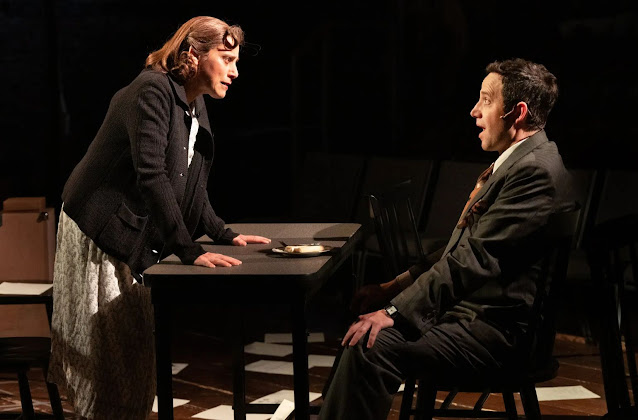 |
| Judy Kuhn and Santino Fontana in I Can Get It for You Wholesale. (Photo: Sara Krulwich) |
The composer-lyricist Harold Rome, who died in 1993, has been more or less forgotten, but he was one of the few Broadway songwriters who wore his leftist politics on his sleeve. He broke through in a 1937 revue called Pins and Needles that focused on the uneasy relationship between management and labor and was produced by the International Ladies’ Garment Workers’ Union, whose members performed the sketches and musical numbers. How it managed to move from a tiny studio above the Labor Stage (the former Princess Theatre) to a Broadway house is something of a mystery, but counting all three editions, it ran for more than three years and made Rome’s reputation. His career spanned more than three more decades. A few of his shows were successful: the 1946 revue Call Me Mister, about returning servicemen; Wish You Were Here (1952), an adaptation of the Arthur Kober play Having Wonderful Time, set at an adult summer camp in the Catskills; Fanny (1954), based on a trilogy of French romantic dramas by Marcel Pagnol; and Destry Rides Again (1959), with Andy Griffith and Dolores Gray taking the roles played famously by Jimmy Stewart and Marlene Dietrich in the 1939 picture, a hybrid western-romantic comedy. (Destry Rides Again was the first show I saw on Broadway, when I was eight.) Until this season the only one that has been revived in New York, to my knowledge, is Fanny, which made it onto an Encores! slate in 2010 and proved to be just as bland and unmemorable as the original cast album indicated. It would be fun for someone to mount Wish You Were Here, which contains some lovely songs; Eddie Fisher made the hit parade with his recording of the title song. But don’t get your hopes up: in the original version the director, Joshua Logan, and the designer, Jo Mielziner, flooded the orchestra pit to create a swimming pool, which made even a pre-Broadway tryout tour impossible.
After the one-of-a-kind Pins and Needles, Rome’s most interesting musical was I Can Get It for You Wholesale (1962), which Jerome Weidman culled from his 1939 novel about life in Manhattan’s garment district. If musical theatre mavens know it at all, it’s for introducing Barbra Streisand, who played the indispensable secretary of the show’s protagonist, Harry Bogen, and brought down the house with her big number, “Miss Marmelstein.” (Bogen was played by Elliott Gould, nearly a decade before Robert Altman made him a movie star in M*A*S*H; Gould became Streisand’s first husband. And Streisand was among the singers who made the only recording of the score for Pins and Needles the same year, to honor the twenty-fifth anniversary of its premiere.) Perhaps Trip Cullman’s sharp-edged, sharp-witted production of Wholesale for Classic Stage Company, which closes December 17, will have the effect of bringing a woefully neglected musical to light. Weidman’s son John, who wrote the books for three of Stephen Sondheim’s shows – including, in this critic’s opinion, his finest, the 1975 Pacific Overtures – has reworked the original book, and never having read the original I can’t say how much he’s altered it. One change I could deduce by looking at the 1962 playbill online: he’s added an opening episode with real punch that dramatizes Harry’s first bitter experience of the tough (and anti-Semitic) New York streets, which, at about thirteen years of age, he has to navigate while delivering goods for garment manufacturers. Weidman, Cullman and the inventive choreographer, Ellenore Scott, have initiated this section with a dance number featuring the talented young dancer Victor de Paula Rocha as the young Harry and ended it with Judy Kuhn as Mrs. Bogen introducing the song “Eat a Little Something,” which didn’t appear until late in the second act in the original production. In this iteration that version of the song is a reprise, sung to Santino Fontana as the grown-up Harry.





